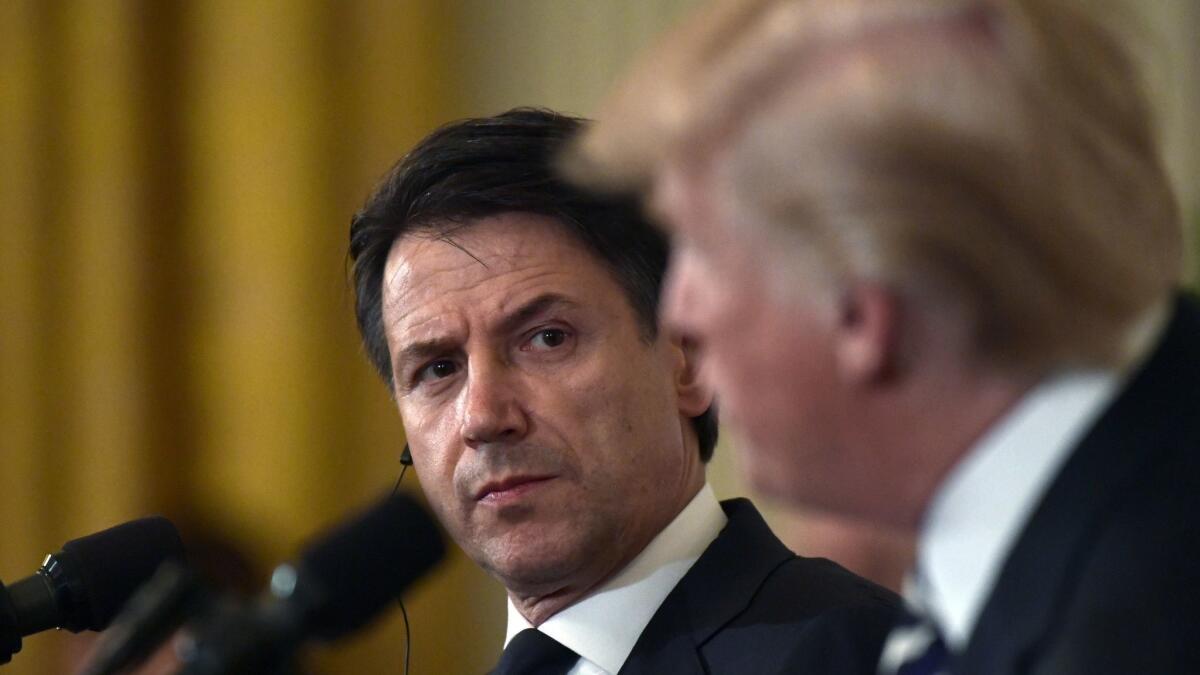Italian prime minister’s resignation could bring elections in fall

- Share via
ROME — Italian Prime Minister Giuseppe Conte resigned Tuesday amid the collapse of the 14-month-old populist government, raising the possibility of new elections in the fall that could bring to power the anti-immigrant interior minister who engineered Conte’s downfall.
Addressing the Senate, Conte assailed Matteo Salvini for setting in motion a “dizzying spiral of political and financial instability” by essentially pulling the plug on the government. Salvini’s right-wing League party sought a no-confidence vote against Conte earlier this month, a stunningly bold move for the government’s junior coalition partner.
Conte blamed Salvini for sacrificing the government’s survival in favor of his eagerness to become prime minister.
A lawyer with no previous political experience who was tapped to break a postelection stalemate last year, Conte struggled to hold together his often ideologically opposed coalition’s forces — Salvini’s right-wing League and the anti-establishment Five Star Movement. He handed his resignation to President Sergio Mattarella at the presidential palace Tuesday night.
Mattarella, who is head of state, asked Conte and the rest of the government to stay on in a caretaker role. The president could test whether there’s enough support for a new government. Failing that, he might try to build a consensus to back a “neutral” figure to head a government whose main goal would be to lead the country through year’s end, enough time to make painful budget cuts to meet European Union parameters.
If no other path is feasible, Mattarella would have to dissolve Parliament. Elections could then be held as soon as late October — 3½ years ahead of schedule.
Salvini, who sat next to Conte during his speech, smirking at times, declared, “I’d do it all again.” He repeatedly kissed a rosary he slipped out of his pocket right after Conte rebuked him for associating “political slogans with religious symbols.”
Pressing for elections as soon as possible, Salvini said: “I don’t fear Italians’ judgment.”
Salvini’s party is soaring in opinion polls and triumphed in European Parliament elections in May. He’s intent on capitalizing on this popularity with national elections.
His crackdown on migrants, whom the party’s voter base largely blames for crime, appears to be a huge factor in Salvini’s climbing popularity. The interior minister has adopted especially harsh measures against private rescue boats, which he contends essentially facilitate human trafficking of migrants across the Mediterranean from smugglers’ bases in Libya to European shores.
Salvini insists that citizens are also behind his call for less influence by the European Union on everyday Italian life. Supporters at his rallies cheer his “Italians first” policies.
Should any early elections sweep Salvini into power, financial markets could be rattled by his Euroskepticism.
Depicting himself in counterpoint to Salvini’s often-derogatory depiction of European Union rules, Conte said he had “tried in these 14 months to guide Italy’s policy along the path of a critical pro-Europe line, but always oriented constructively.”
Analysts will be focused on prospects that any Salvini-led government could further fray Italy’s relation with the EU, headquartered in Brussels.
A League-led government would have a “stronger Euroskeptic stand — fighting with Brussels on everything that is politically salient in Italy,” Wolfango Piccoli, co-president of the London-based analyst firm Teneo, told the Associated Press.
The outgoing government enacted some populist measures, including the Five Star Movement’s guaranteed minimum income for the jobless. Whoever holds the helm of government this fall will have to slash spending, probably displeasing constituencies. Failure to do so would trigger another highly unpopular measure — an automatic increase of the sales tax.
Salvini is already campaigning for a slashed income tax, raising concerns about where a League-led government would find the money to deliver on that promise.
While lawmakers argued, hundreds of miles to the south the latest migrant standoff played out near a tiny Italian island. For weeks, more than 100 migrants had been stuck aboard a Spanish humanitarian rescue ship and not allowed by Salvini to disembark at Lampedusa, part of his crusade against such migration efforts.
But hours after Conte resigned, the migrants finally set foot on Lampedusa. The Italian news agency ANSA said a Sicilian prosecutor ordered the seizure of the Open Arms rescue vessel and the migrants’ evacuation. Prosecutors are investigating the humanitarian group’s complaint against Salvini, accusing him of kidnapping for refusing to open the ports.
Former Prime Minister Matteo Renzi, a leader of the Democratic Party, Parliament’s largest opposition party, seized on Salvini’s rosary display to denounce the migrant crackdown.
“Minister Salvini, I respect your religious faith,” Renzi said, launching into a barb that played off their common first name, Matteo. “But if you believe in Chapter 25 of the Gospel, naturally by Matthew, ‘I was hungry and you gave me to eat, I was naked and you dressed me,’ if you have these values, unblock those persons held hostage by your policies.”
Salvini has taken to dangling a rosary and invoking the protection of the Virgin Mary in political rallies around the country.
More to Read
Sign up for Essential California
The most important California stories and recommendations in your inbox every morning.
You may occasionally receive promotional content from the Los Angeles Times.













